|
|
|
Sort Order |
|
|
|
Items / Page
|
|
|
|
|
|
|
| Srl | Item |
| 1 |
ID:
185330
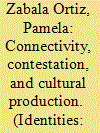

|
|
|
|
|
| Summary/Abstract |
In this paper, I employ thematic analysis of text data from a web forum to highlight the prevalent debates and themes that emerge in online discussions of Dominican identity. I find that these spaces can be arenas for identity contestation where what I refer to as traditionalist understandings of race and culture clash with non-traditionalist perspectives. When this happens, users rely on a number of strategies to rouse cultural memory, evoke racialised emotions, and establish cultural legitimacy. Forum participants create digital imagined communities where they can perform and share the particularities of their culture, while producing new conditions of cultural legitimacy and belonging. As technological innovation provides new platforms where diasporic and non-diasporic members of a nation can come together, it is important to continue to explore the role of online spaces as sites of cultural production.
|
|
|
|
|
|
|
|
|
|
|
|
|
|
|
|
| 2 |
ID:
185333


|
|
|
|
|
| Summary/Abstract |
This article reports on data collected from the online community forums of four Uyghur language websites between 2014–2016. These posts are representative of a moment in time in which the Uyghur cultural identity was being threatened by increasingly restrictive Chinese government policies. Concept coding was applied to online discussion posts and comments, through which we identified common ideas and ‘concepts’ from the emergent themes. Findings demonstrate how these Uyghur language websites served as a platform for an online community to negotiate their cultural identity and strengthen community ties. Uyghur individuals posted materials that built cultural knowledge, reinforced cultural pride, and encouraged community cultural support.
|
|
|
|
|
|
|
|
|
|
|
|
|
|
|
|
| 3 |
ID:
185329
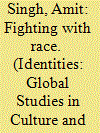

|
|
|
|
|
| Summary/Abstract |
Drawing upon ethnographic fieldwork conducted at an East London Kickboxing/Muay Thai gym, this paper explores how fighters at Origins Combat Gym seek to reject race as a discursive category in favour of constructing each other as the same, bonded by years of intimately training alongside one another. Drawing upon Bourdieu, I conceptualise a racial habitus to argue that such processes are constrained; my field-site is not a racial utopia, even if it does allow for new possibilities. Nonetheless, my interlocutors’ attempts to reject the logic of ethnic absolutism through forging complex localised solidarities offers hope in anti-immigrant times.
|
|
|
|
|
|
|
|
|
|
|
|
|
|
|
|
| 4 |
ID:
185332
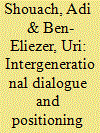

|
|
|
|
|
| Summary/Abstract |
How do immigrant’s children cope with racist hegemonic discourse? To what extent, is their response effective? The article addresses this issue through an exploration of the identity and positioning strategies of children of 100,000 ‘Black Jews’ who immigrated to Israel from Ethiopia at the end of the last century. Drawing on the sociology of generations, we show that members of the second generation of Ethiopian immigrants developed a different identity and a contradictory positioning strategy to that of the 1.5 generation, while both failed to reduce racism in Israel. Contrary to Karl Mannheim’s linear theory, we argue that intergenerational encounters produce a new identity and a new positioning strategy that may be effective in creating social change. It was only through massive demonstrations in the year 2015 that intergenerational dialogue was created, leading to a new positioning strategy that proved to be effective in undermining racist hegemonic discourse.
|
|
|
|
|
|
|
|
|
|
|
|
|
|
|
|
| 5 |
ID:
185328
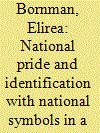

|
|
|
|
|
| Summary/Abstract |
The article investigates national pride, identification with national symbols and predictors of national pride some 20 years after South Africa’s political transformation. The results of a questionnaire survey involving a countrywide probability sample of 3 608 respondents are compared with those of a 1998 study. Compared to the 1998 study, there was a decline in national pride, while identification with national symbols increased. Particularly noteworthy were increases among Afrikaans-speaking Whites who dis-identified with national symbols in 1998. Significant group differences were found for all variables and group membership was indicated as the most important predictor of national pride. The national anthem was the most important symbol predicting national pride. Indications are that symbols reflecting various cultural legacies have a better chance of being widely accepted in heterogeneous societies.
|
|
|
|
|
|
|
|
|
|
|
|
|
|
|
|
| 6 |
ID:
185331
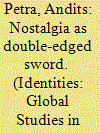

|
|
|
|
|
| Summary/Abstract |
Based on multi-sited ethnography, this article examines the return visits of Australian-Hungarian diaspora subjects after the fall of the Berlin Wall. In particular, it explores how nostalgia becomes an instrument for navigating the ambiguities, paradoxes, and disappointments of return and forging new and creative relationships with the home country. I argue that as much as nostalgia has contributed to the shattering of returnees’ illusions in the face of ‘reality’ upon returning, it has also helped them to facilitate deeper feelings of immersion with their home country. In this way, this article elucidates the restorative properties of nostalgia for identity and belonging.
|
|
|
|
|
|
|
|
|
|
|
|
|
|
|
|
| 7 |
ID:
185327
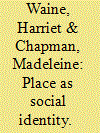

|
|
|
|
|
| Summary/Abstract |
This article is based on analysis of narrative interviews with individuals active in local community work in the aftermath of the Grenfell Tower fire. It explores how the public spaces and buildings around the tower were claimed and shared by the community, first for emergency support and then for collective mourning, remembrance, worship, and activism. Applying the social psychology of community participation, the article elaborates place identity as a form of social identity and shows how participation functions to organise shared representations of local conditions and facilitate empowerment for social change. Further, the article posits that, in contexts of urban super-diversity, the shared use of local spaces, including faith spaces, generates new forms of belonging-in-multiculture that can become the basis for community development and collective struggle against racialised marginalisation.
|
|
|
|
|
|
|
|
|
|
|
|
|
|
|
|
|
|
|
|
|